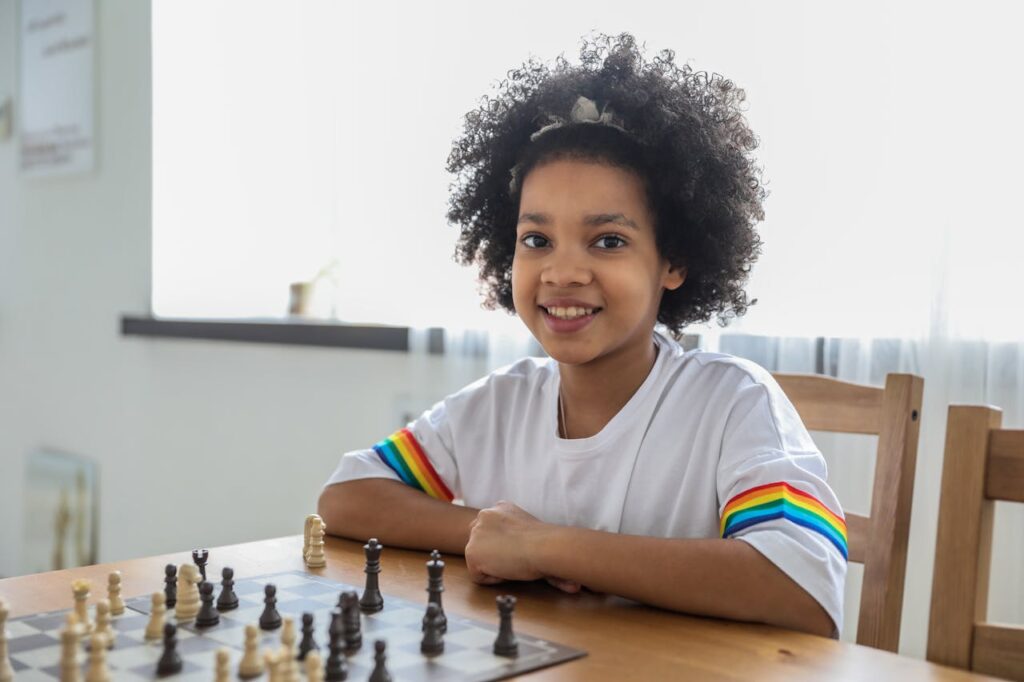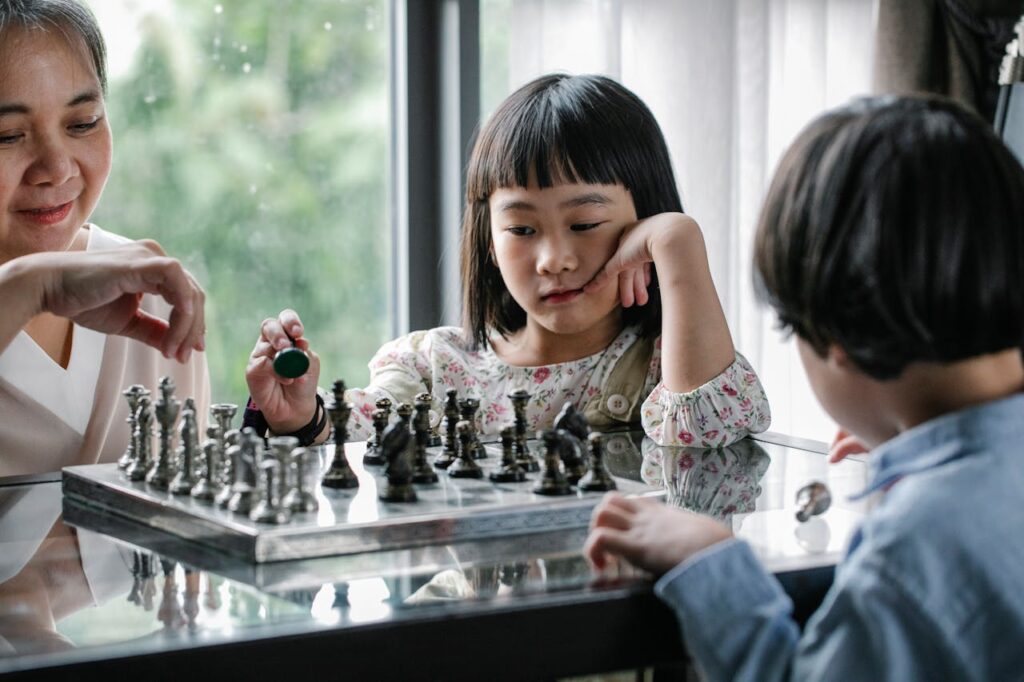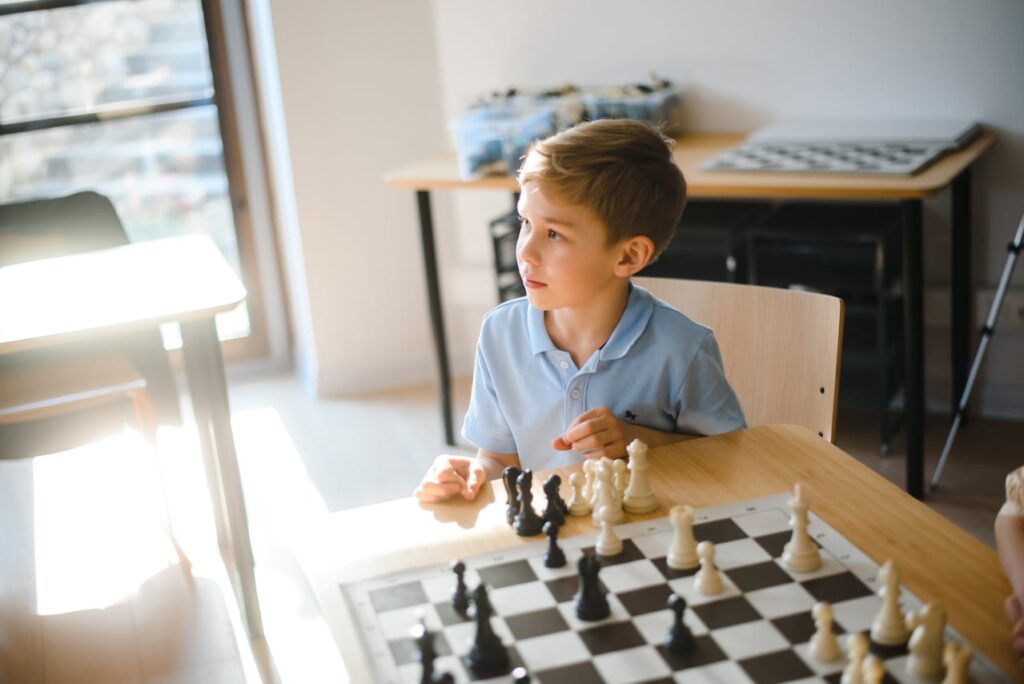Every parent wants their child to grow up smart, confident, and capable of tackling life’s challenges. While there are many activities that can contribute to a child’s development, one that stands out is chess.
Chess is more than just a game; it’s a powerful educational tool that nurtures a child’s cognitive abilities, improves their problem-solving skills, and enhances their capacity for critical thinking. By introducing your child to chess, you’re giving them a head start on the path to becoming a smarter, more well-rounded individual.
How Chess Boosts Cognitive Development
Chess is often referred to as the “gymnasium of the mind” for good reason.
The game is a mental workout that exercises various parts of the brain, helping to develop and strengthen key cognitive skills. Here’s how chess can play a pivotal role in boosting your child’s cognitive development.
Enhances Problem-Solving Skills
One of the most significant cognitive benefits of chess is its ability to enhance problem-solving skills.
Every move in chess presents a new challenge that requires careful consideration. Players must think critically about their options, anticipate the opponent’s responses, and choose the best course of action.
This continuous process of identifying problems and finding solutions helps children develop sharp problem-solving abilities.
In chess, there is rarely a single correct answer to any given situation. Instead, children learn to evaluate different possibilities, weigh the pros and cons of each move, and make decisions based on logical reasoning.
This type of thinking is directly applicable to real-life situations, where problem-solving is often about finding the best possible solution among many options.

Improves Memory and Concentration
Chess is a game that demands a high level of concentration and memory. To play effectively, children need to remember how each piece moves, recall previous moves, and anticipate future possibilities.
This constant mental engagement helps improve both short-term and long-term memory.
As children play more chess, they begin to develop the ability to recognize patterns and recall previous game scenarios.
This pattern recognition is not just about remembering moves; it’s about understanding strategies and applying them in new situations.
Over time, this ability to recognize and recall patterns helps improve overall memory retention.
Concentration is another key skill developed through chess. The game requires players to focus intently on the board, often for extended periods.
Fosters Critical Thinking
Critical thinking is the ability to analyze information, evaluate different perspectives, and make informed decisions.
Chess is an excellent tool for developing this skill, as it requires players to think several moves ahead, consider the consequences of each move, and adapt their strategies based on the opponent’s actions.
In chess, children learn to approach problems from different angles, considering various possibilities before making a decision.
This type of thinking helps them develop the ability to think critically and make well-reasoned decisions, both on and off the chessboard.
Encourages Creative Thinking
While chess is often seen as a game of logic and strategy, it also offers ample opportunities for creative thinking.
Each game of chess is like a blank canvas, where players can experiment with different moves and strategies, creating their own unique approach to the game.

Children who play chess regularly develop the ability to think creatively, finding innovative solutions to complex problems.
This creativity is not limited to the chessboard; it spills over into other areas of life, encouraging children to think outside the box and approach challenges with an open mind.
Chess as a Tool for Academic Success
Chess is not just a game; it’s a powerful educational tool that can significantly impact a child’s academic performance.
The skills developed through playing chess are directly transferable to the classroom, helping children excel in subjects like math, science, and reading.
Strengthens Mathematical Skills
Chess and math share a deep connection, particularly in the areas of logic, problem-solving, and pattern recognition.
When children play chess, they constantly engage in activities that strengthen their mathematical abilities, even if they don’t realize it.
For instance, chess requires players to calculate moves ahead of time, considering various possibilities and their potential outcomes.
This process is similar to solving complex math problems, where children must analyze different factors, apply logical reasoning, and arrive at a solution.
The ability to think several steps ahead in chess translates well to mathematical thinking, where planning and foresight are crucial.
Enhances Reading and Comprehension Skills
Chess also contributes to the development of reading and comprehension skills.
Although it may not seem immediately obvious, the cognitive processes involved in playing chess are similar to those used in reading and understanding texts.
When children play chess, they must analyze the board, interpret the opponent’s moves, and plan their strategies accordingly.
This requires them to process information, make connections, and draw conclusions—skills that are directly applicable to reading comprehension.
In addition, chess often involves learning new strategies, reading chess books, or studying famous games.
These activities encourage children to engage with written material, expanding their vocabulary and improving their ability to understand and analyze complex information.
Encourages Scientific Thinking
Science is all about inquiry, experimentation, and discovering new knowledge.
Chess fosters a similar approach to thinking, where children are encouraged to explore, experiment, and learn from their experiences.
In chess, players constantly test hypotheses by trying out different moves and strategies. They observe the results, learn from their mistakes, and refine their approach based on what they’ve learned.

This process of trial and error is similar to the scientific method, where scientists develop theories, conduct experiments, and draw conclusions based on the outcomes.
By engaging in this type of thinking through chess, children develop a scientific mindset that is curious, analytical, and open to new ideas.
They learn to approach challenges with a problem-solving attitude, using evidence and logic to guide their decisions.
Builds Confidence in Learning
One of the most important benefits of chess is the confidence it builds in children as learners. Every game of chess, whether won or lost, is an opportunity for learning and growth.
As children develop their skills, master new strategies, and improve their gameplay, they experience a sense of achievement that boosts their self-esteem and confidence.
This confidence is crucial for academic success, as it encourages children to take on new challenges, ask questions, and persist in the face of difficulties.
When children believe in their ability to learn and grow, they are more likely to engage actively in their education, take risks, and embrace new learning opportunities.
Chess as a Lifelong Skill
While the academic benefits of chess are clear, the value of chess extends far beyond the classroom. Chess is a game that can be enjoyed throughout life, offering both immediate and long-term benefits.
By introducing your child to chess, you’re not just helping them become smarter in school; you’re giving them a skill that will enrich their lives for years to come.
Developing Patience and Delayed Gratification
In a world that often emphasizes instant results, chess teaches the importance of patience and delayed gratification.
Success in chess doesn’t come quickly or easily; it requires careful planning, sustained effort, and a willingness to wait for the right opportunity.
As children play chess, they learn that hasty decisions often lead to mistakes, while careful, deliberate thinking produces better outcomes.
They begin to understand that sometimes it’s worth waiting to execute a strategy, rather than rushing into a move. This lesson in patience is valuable not just in chess, but in all areas of life.
Patience and delayed gratification are key components of long-term success.
Whether it’s studying for an exam, saving money for a future goal, or working on a long-term project, the ability to stay focused and committed over time is crucial.
Fostering Social Connections and Sportsmanship
Chess is often seen as a solitary game, but it’s also a deeply social activity. Whether played face-to-face or online, chess brings people together, providing opportunities for meaningful social interactions.
By playing chess, children learn important social skills such as communication, cooperation, and sportsmanship.

In a chess game, children must communicate with their opponents, whether it’s through verbal exchanges during a face-to-face game or written messages in an online match.
They learn to engage respectfully with others, regardless of whether they win or lose.
This practice of good sportsmanship helps them develop empathy, humility, and a sense of fair play—qualities that are essential for building strong, positive relationships.
Additionally, participating in chess clubs, tournaments, or online communities allows children to connect with others who share their interests.
Building Resilience and Adaptability
Life is full of challenges and setbacks, and one of the most valuable lessons chess teaches is resilience. In chess, as in life, things don’t always go as planned.
Sometimes, a carefully thought-out strategy doesn’t work, or an opponent makes an unexpected move that changes the course of the game.
Through these experiences, children learn to adapt to new situations, recover from mistakes, and keep moving forward.
They understand that losing a game is not a failure, but an opportunity to learn and improve.
This resilience is crucial for success in all areas of life, as it helps children bounce back from setbacks and approach challenges with a positive, problem-solving attitude.
Promoting Lifelong Learning and Intellectual Curiosity
Chess is a game of endless possibilities. No two games are ever the same, and there is always something new to learn or discover.
This complexity makes chess a perfect tool for promoting lifelong learning and intellectual curiosity.
As children explore the world of chess, they are encouraged to keep learning, experimenting with new strategies, and exploring different aspects of the game.
This continuous learning process fosters a love of intellectual exploration and a desire to improve, which can extend to other areas of their lives.
Children who develop a passion for chess often carry this love of learning into adulthood. They become curious, engaged thinkers who are eager to explore new ideas and take on new challenges.
This intellectual curiosity is a powerful motivator for personal and professional growth, helping them stay engaged and fulfilled throughout their lives.
Chess as a Source of Relaxation and Stress Relief
In addition to its cognitive and social benefits, chess can also be a source of relaxation and stress relief.
The game’s focus on strategic thinking and problem-solving provides a mental escape from the stresses of everyday life.
When children play chess, they immerse themselves in the game, which helps them take their minds off worries and challenges.
Chess also offers a sense of control and order, which can be calming for children.
The game’s rules and structure provide a predictable framework within which they can explore different strategies and solutions.
This sense of order can be particularly comforting during times of uncertainty or stress.
Practical Tips for Integrating Chess into Your Child’s Life
Now that we’ve explored the many benefits of chess, let’s discuss some practical ways to integrate chess into your child’s daily routine.
Whether your child is a complete beginner or has some experience with the game, these tips will help you create a positive and supportive environment for their chess journey.
Start with the Basics
If your child is new to chess, it’s important to start with the basics. Begin by teaching them the names of the pieces and how they move.
Use simple, clear explanations and give them plenty of opportunities to practice each piece’s movements.
You can start with mini-games that focus on just a few pieces, such as pawns and rooks, before gradually introducing the other pieces.
This step-by-step approach helps build a solid foundation and ensures that your child doesn’t feel overwhelmed.
As they become more comfortable with the rules, you can introduce basic strategies, such as controlling the center of the board or developing their pieces.
Make Chess a Part of Your Routine
To help your child develop a love for chess, try making it a regular part of your daily or weekly routine.
Set aside time for chess each day, whether it’s in the morning before school, in the afternoon after homework, or in the evening before bed.
Consistency is key. The more regularly your child plays chess, the more they will improve, and the more they will enjoy the game.
Even just 15 to 20 minutes a day can make a big difference in their skills and their enjoyment of the game.
If possible, make chess a family activity. Playing chess together as a family not only strengthens your child’s skills but also provides valuable bonding time.
It’s an opportunity to connect, share strategies, and celebrate each other’s progress.
Use Online Resources and Apps
There are many online resources and apps available that make learning chess fun and accessible.
These platforms often include interactive lessons, puzzles, and games that are designed to engage children and help them improve their skills.
For younger children, look for apps and websites that use colorful graphics, animations, and simple explanations.
Many of these platforms offer beginner-friendly tutorials and games that make learning chess feel like playing a video game.
For older children, consider introducing them to online chess communities where they can play against other players from around the world.
These communities provide opportunities for friendly competition, learning from more experienced players, and connecting with others who share their interest in chess.

Encourage Participation in Chess Clubs or Tournaments
If your child shows a strong interest in chess, consider enrolling them in a local chess club or signing them up for chess tournaments.
These activities provide valuable opportunities for your child to practice their skills, learn from others, and build confidence.
Chess clubs offer a supportive environment where children can play against peers, receive coaching, and participate in friendly competitions.
Being part of a chess club also helps children develop a sense of community and belonging, which can be motivating and rewarding.
Celebrate Progress and Enjoyment
Above all, it’s important to celebrate your child’s progress and enjoyment of the game. Chess is a challenging activity, and every improvement—no matter how small—is an achievement worth recognizing.
Praise your child for their efforts, whether they win or lose a game. Encourage them to reflect on what they’ve learned and how they can apply those lessons in future games.
By focusing on the learning process rather than the outcome, you help your child develop a growth mindset and a love for the game.
Conclusion
Chess is much more than just a game—it’s a powerful tool for raising a smarter, more capable child.
The cognitive, academic, and social benefits of chess are well-documented, and the skills developed through playing chess are transferable to all areas of life.
By introducing your child to chess, you’re not only helping them excel academically but also equipping them with the tools they need to succeed in life.
At the Global School of Chess, we’re passionate about helping children unlock their full potential through the game of chess.
Our programs are designed to be engaging, accessible, and effective, ensuring that every child can experience the many benefits that chess has to offer.
READ NEXT:

